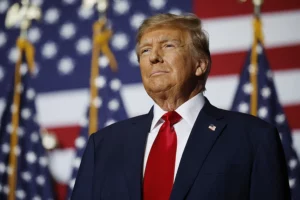President Donald Trump has recently signed two significant memorandums designed to bolster American businesses and safeguard national economic interests, particularly targeting unfair digital service taxes imposed by other nations and curbing Chinese investments in critical U.S. industries.
Trump Signs Memorandums to Protect U.S. Businesses from Digital Taxation and Chinese Investments

Trump Signs Memorandums to Protect U.S. Businesses from Digital Taxation and Chinese Investments
New directives aim to defend American economic interests against unfair foreign tax practices and limit Chinese presence in key industries.
In a move to protect U.S. technology companies, Trump's first memorandum addresses countries that impose digital service taxes on American firms such as Apple, Google, Meta, and Amazon. Nations like France, Canada, and the UK have been accused of extracting billions from these companies through controversial taxation policies. The memorandum enacts tariffs against these nations while directing the U.S. Trade Representative to reassess similar tax policies worldwide. A White House fact sheet articulates the administration's position, stating that “only America should be allowed to tax American firms.”
Concurrently, the second memorandum seeks to restrict Chinese access to essential U.S. industries by safeguarding resources, technology, and infrastructure. While China isn't explicitly named, it's evident that Trump aims to limit foreign exploitation of key sectors such as technology, agriculture, shipping, minerals, and food production. The Committee on Foreign Investment in the United States (CFIUS) will establish new guidelines to limit Chinese investments in industries vital to national security, with considerations also being made to restrict outbound U.S. investments to China, reflecting a concerted effort to diminish economic reliance on Beijing.
These initiatives stem from Trump's ongoing "America First" policy, reinforcing the belief that U.S. industries must be insulated from foreign economic strategies that threaten American innovation and security. The rise of digital service taxes has provoked concern as nations like France and Canada continue to generate hefty revenues by taxing American-owned digital products like music, video games, and software. The newly introduced tariffs respond to these policies, aiming to create a more equitable global economic environment for U.S. businesses.
Furthermore, the threat posed by Chinese investments in crucial American industries has prompted bipartisan alarm in Washington, prompting the new policy which asserts that economic security aligns closely with national security. This strategic maneuver exemplifies the administration's resolve to protect America's financial autonomy from foreign influences.
By enacting these memorandums, President Trump is making a robust statement about his dedication to shielding American enterprises from economic aggression, ensuring the resilience and self-sufficiency of the U.S. economy. As foreign governments continue to exploit American innovations and resources, these policies communicate a clear message: the U.S. economy is not for sale.
Concurrently, the second memorandum seeks to restrict Chinese access to essential U.S. industries by safeguarding resources, technology, and infrastructure. While China isn't explicitly named, it's evident that Trump aims to limit foreign exploitation of key sectors such as technology, agriculture, shipping, minerals, and food production. The Committee on Foreign Investment in the United States (CFIUS) will establish new guidelines to limit Chinese investments in industries vital to national security, with considerations also being made to restrict outbound U.S. investments to China, reflecting a concerted effort to diminish economic reliance on Beijing.
These initiatives stem from Trump's ongoing "America First" policy, reinforcing the belief that U.S. industries must be insulated from foreign economic strategies that threaten American innovation and security. The rise of digital service taxes has provoked concern as nations like France and Canada continue to generate hefty revenues by taxing American-owned digital products like music, video games, and software. The newly introduced tariffs respond to these policies, aiming to create a more equitable global economic environment for U.S. businesses.
Furthermore, the threat posed by Chinese investments in crucial American industries has prompted bipartisan alarm in Washington, prompting the new policy which asserts that economic security aligns closely with national security. This strategic maneuver exemplifies the administration's resolve to protect America's financial autonomy from foreign influences.
By enacting these memorandums, President Trump is making a robust statement about his dedication to shielding American enterprises from economic aggression, ensuring the resilience and self-sufficiency of the U.S. economy. As foreign governments continue to exploit American innovations and resources, these policies communicate a clear message: the U.S. economy is not for sale.





















